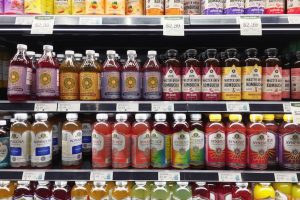
We adore herbs, especially since they are an important factor of our kombuchas. When delving a bit deeper in the history of herbal usage and how they can benefit our health, we bumped into Lode Claus the owner of the century-old company 'Kruiden Claus'. As we shared the same interests, we quickly forgot about time and had an extensive conversation 'all about herbs'. A conversation so extensive and interesting we had to write a blog article on it!
What is the story behind 'Kruiden Claus' and how did you get into the business?
The story of Kruiden Claus becomes clear when you look at the logo. One of my first marketing stunts was to add "since 1900". After all, 1900 could arguably be the beginning of the company that is now Kruiden Claus. Hanging in the orangerie are several diplomas and certificates from ancestors. These date back to the 1800s and 1900s.
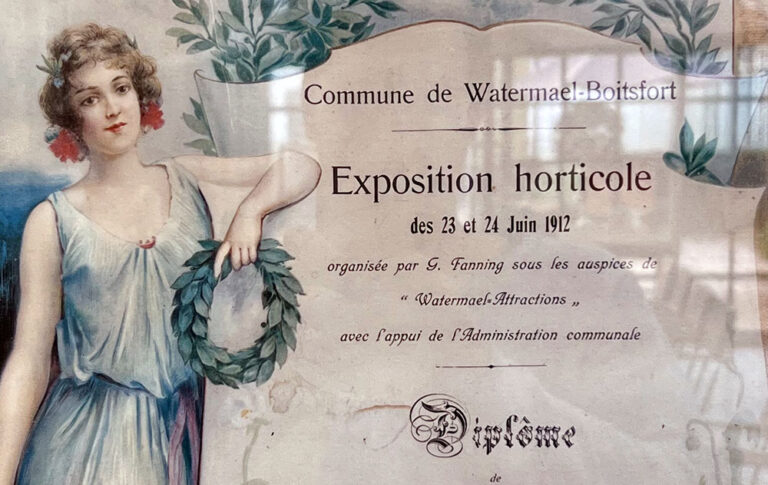
It was Adolf Claus who had a green thumb, in the sense that he had an interest in both herbs and edible plants. Adolf was born and raised in Belgium, but there were no gardening schools back then. So what you had to do if you wanted to learn the craft at that time was to go to the place where the craft was practiced. Back then it was France with its many castles and castle gardens. Those castle gardens consisted of splendor, of course, but more importantly, herbs and edible plants. Both the vegetable garden and the herb garden were ever present in the castle gardens.
Adolf learned the trade there. He then stopped in Overijse for a while - the famous area for producing grapes - to learn how to grow them. Then he settled in Kruishoutem, where until about 35 years ago the location of Kruiden Claus was.
Adolf's son, Auguste Claus, also proved to have a green thumb. He grew vegetables and herbs. He also sold these plants at the market in Kortrijk.
The company has gone through wars but has always persisted; the family has always continued to farm. My father, Christian Claus, was again a son with a green thumb. He is the one who put the story of herbs on the map in Belgium. Very few herbs were cultivated at that time, and those that were cultivated were the very common ones. My father experimented with different species and built up a very extensive range. He actually received an award from Minister Lavens (who was then the Minister of Agriculture) for his pioneership. My father continued to focus on expanding the assortment as widely as possible, instead of concentrating on large-scale production. In doing so, he looked primarily at culinary herbs, but always in connection with the medicinal component.
I was born in 1987. I was a fourth generation, but never felt destined to grow herbs. I come from a family with three children, and as a child there were always times when we had to help out. We weren’t always very keen to help out but we did it, and in that way we naturally acquired a basic work ethic on the one hand and a basic herbal knowledge on the other.
I then went to college in Waregem and after that I did a master's degree in business sciences in Ghent. I then did some further work on law-related issues at the VUB in Brussels. But at a certain point my father became very ill. That was difficult for us as a business. I then combined my master year with working at the farm. Then I found the passion for herbs and started to develop my own story around it. I realized that this is a family story. A story that I have a nice solid foundation in just because of those ancestors, and therefore I also have the opportunity to continue a wonderful story. So instead of providing a temporary solution, I stayed in the business. I think I've been in the business for about 12 years now. In the meantime, my father is also back on his feet and remains active in the business.
So we are at the fourth generation, and to this day it has always remained a father-son story. The previous generations were all innovative, and of course I'm trying to keep the story going and to build further on it. Marketing-wise, that will translate into, among other things, the brand name Fiston. Fiston is the French word for son. It pays homage to the ancestors and it can translate our wide range of products and services into a clearer structure. We have been growing much more than just herbs for years, so Kruiden Claus no longer really covers the full range. We also grow edible flowers, forgotten vegetables and strawberry plants; but we also do more than just farming. We host about 60 to 70 groups a year, we do workshops and events. Hence a new brand identity for the broader activities.
Is there a particular herb that has always been central throughout this family story?
Lemon verbena has always been a constant within our company. Lemon verbena also has the French name verveine, and the French know it mainly because it is a very tasty herb with a citrus aroma - a lemon smell and taste - that tastes and smells better than lemon itself. You can perfectly incorporate it in iced tea or alcoholic beverages, but it also brings a nice added value in sorbet or in all kinds of fish preparations.
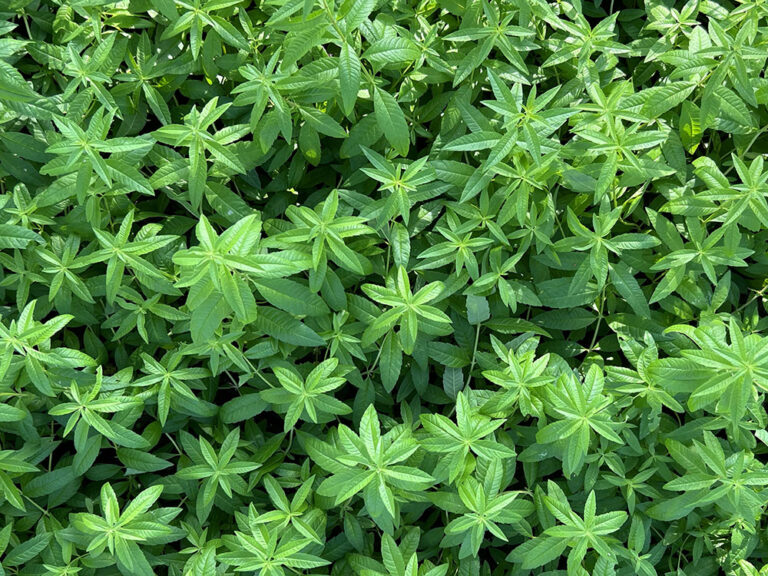
My father has grown some cuttings of lemon verbena early in his career. These are still from this original species from France, so this herb has been with us from the beginning. Meanwhile, one of our broadened activities is the development of some drinks and these have the lemon verbena as a base, so that's nice family-wise.
Which herbs would you gift, and why?
There are many! Thyme, for instance, is a good gift. The Latin name can clarify a lot about this: thymus vulgaris. Thymus comes from thymon, which means courage and strength. Knights and soldiers drank thyme tea or took a bath with thyme before going to battle, to gain courage and fortitude. So if you want to wish someone courage and strength you can do it with a thyme plant or a drink with thyme in it. I have done that several times when someone is going through a difficult time. It may be a bit sentimental but it carries a nice symbolism.

Rosemary is another nice one. This is the herb of love, loyalty and remembrance. So on Valentine's Day, the ideal gift for your loved one is a big bunch of rosemary. The first year that works perfectly, the second year a little less. And the third year I haven't tried yet.
Another cool one is mint. Mint is the symbol of gratitude, hospitality and friendship. It has its origins in the Arab world and still exists in the serving of mint tea, but its original use would be to make the house smell good when guests came over. Mint grows everywhere and was easy to obtain, so people took some sprigs and rubbed it on door frames, on tables and chairs, basically on anything the guests would come in contact with. The menthol gave it a refreshing scent.
Sage also makes a good gift. Here the origin goes back to the Latin name again, salvia officinalis. Salvia can be traced back to the word "salvere," which means to heal. Then there's this Chinese proverb as well: "why should people die when sage grows in their garden?" So when you wish someone good health, gift them sage.
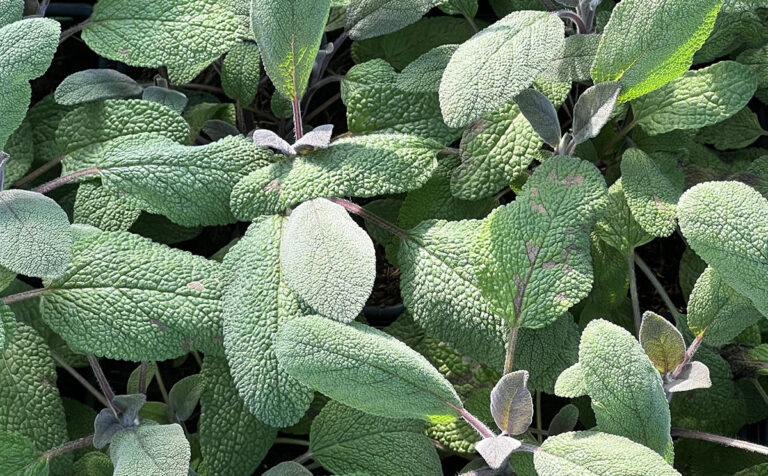
In the early days of Kruiden Claus, the days of the French castle gardens, there was much thought about the health benefits of herbs. What is your take on that today?
Herbs have several functions. The culinary aspect has always been there. Indeed, the medicinal component has also been particularly relevant in the past. So in the old days, you mainly saw the combination of both the culinary and the medicinal functions. In the days of castle gardens, people needed herbs to stay healthy on the one hand and to add nutritional value and flavour on the other hand, in terms of culinary benefits.
Over time, the function of herbs has evolved mainly towards the culinary domain. People have increasingly neglected the medicinal function of herbs, but nowadays you notice that more people are turning back to nature and to healthy food. So the two functions are coming back together again and that is not an illogical thing. If you look at the foundation of health you automatically go to nature. If you look at a lot of Latin names of herbs this also becomes clear. For example sage, salvia officinalis. The free translation of officinalis is "from the apothecaries' workshop". A lot of herbs with the name officinalis are very medicinal and were used in the apothecary world for a long time. Not so long ago - let's say about 15 years - there were still many pharmacists who used dried herbs to make preparations.
People stopped doing this because they preferred to see their medicines - probably partly due to marketing - in the form of a pill or syrup. Today we find that there are many products based on herbs. Many cough syrups are based on thyme. A variety of African geranium is even used in children's cough syrups. So there is certainly a noticeable trend that makes it clear that herbs are once again being picked up by the average person and are also considered credible again. Of course you have to add a note to this. Herbs are beneficial no matter what. They can be said to be medicinal, but one should always refer to the medical world when discussing this matter.
Of course there are still non-believers, but if you were to offer them to eat a poisonous plant I think they would certainly agree that plants do have some effect. If something can be bad, it might as well be good. It's not all fairy tales and witchcraft.
Are there any herbs that, more than others, can be linked to good health?
There are of course the classics like gynacea, but you don't always need to look far. I am thinking for example of rosemary, a herb that is eaten a lot and can be linked to health. There are stories of people who always eat rosemary and are very healthy as a result.
Then there is the immortality herb (Gynostemma pentaphyllum). In Guizhou Province in China, there are a remarkable number of hundred-year-olds living there. After a study of the striking phenomenon, it turned out that those people had one factor in common. That was that they made tea from the herb.
So is tea the best way to draw health benefits from herbs?
As Hippocrates is often quoted, "Let food be thy medicine." Food still seems to me to be the way you can have the greatest reach. It's also the easiest way, you don't have to make too many claims and you can still make some beneficial qualities accessible. If you start specifying it too narrowly, you may get non-believers and you probably will have to deal with legal regulations. So to me, food still seems to be the best way.
Do you see the benefits of incorporating herbs into a drink, as Yugen does?
Of course. I think that's one of the best possible ways to market herbs, and in a tasty way as well! If you want to wish someone courage and strength it doesn't have to be with a thyme plant, it can just as easily be a Cherry Thyme kombucha.
This then includes the beneficial properties of the drink itself, but also of the herbs. Thyme can be powerful, it is also very antibacterial. Sage also has many beneficial properties. It's often used in the fall to soothe sore throats, but it's also just a flavour booster. Story-wise, sage is also a powerful one, as I mentioned a little while ago.
What is your favourite Yugen combination? (We showed Lode all our herbal combinations)
The Cherry Thyme has always been my number 1, but now that I've tasted the Strawberry Basil, they're in first place together!
What are the most effective ways to combine herbs?
Botanically, I tend to start thinking mainly from different areas. Then it's often a logical choice that thyme, rosemary, sage and hyssop, for example, are combined as these are all herbs that grow and are used in the Mediterranean area. These are by nature combinations that work.
Asian spices, on the other hand, usually have very strong flavors that can clash with each other. But if you take very mild-tasting herbs and combine them with stronger ones, it does work. In practice there are sometimes very surprising combinations. There are sometimes combinations that you would not naturally think of, but are perfectly balanced anyhow. In the end, it just has to be right for your taste buds.
Sometimes you can also have a search within certain herb varieties. Thyme, for example, is a very common herb. Everyone knows the classic thyme, but there is also lemon thyme, orange thyme… There is now even lemonade thyme. So take for example the lemon thyme, this combined with citrus seems very nice. The same with orange thyme. This could be a perfect match.
You can also make a lot of subdivisions in the herbal world. You can do that on a plant technical level, for example. You have perennials versus annuals, hardy versus not hardy, evergreen versus deciduous herbs… But you can also subdivide herbs according to Mediterranean or native herbs, for example, and what is also trendy these days are silty herbs. This covers all possible herbs that grow in or around the sea. Oyster leaf, samphire and sea banana, for example, are all herbs that fit under this heading.
Does the soil also affect the quality of the herbs?
The soil certainly has an impact on quality. That makes sense somewhere. The product we cultivate is 'plantgoed'. These are plants that can be further cultivated, be it in full soil or plant pots. They are grown slowly, in soil and according to the season. Here the beneficial properties, flavors and aromas are more strongly contained compared to hydroculture, on which the herbs you find in the supermarket are grown. Hydroculture is, the word says it all, water-based. Those herbs are forced by growing them with water. They're subjected to lighting and heating, which kind of… dilutes all those aromas. Here, of course, I'm talking about two extremes, but obviously the types of soil between them also make a difference.

If you look at the regions in France where lavender grows, it also often has to do with calcium-rich soils. Calcium releases a lot of nutrients and that makes a big difference. So yes, sand soil, clay soil… The soil types do make a difference.
So do you see differences in popularity in herbs across different regions in Europe? And is this related to soil types or is it more cultural?
That's going to be essentially cultural, but it also has to do with temperature and other conditions. Basil, for example, is a difficult herb to grow but in Italy it grows easily. That's because the Mediterranean climate in Italy is a bit warmer and more stable in temperature. In Belgium, the herb is also very well known and loved but because the temperatures are too changeable and because it is often too cold at night, it does not grow easily here.
So the popularity of spices is partly related to weather conditions, but of course there is a shift here. With globalisation, the world is becoming one big village in that regard.
To draw it a little closer to home, it has become clear to us that in the Netherlands, for example, the tastes are somewhat different. Liquorice is popular there, as is licorice grass. Liquorice grass is an easy growing grass with the taste of licorice. It is very well known in the Netherlands. Asian herbs are also more popular with our northern neighbors than with us. This has to do with colonization and the large population in the Netherlands with Asian roots. Lemongrass, coriander and kaffir leaf are herbs from our range that are much sought after by our Dutch customers.
Which herb is easiest to start growing yourself?
The easiest herb to grow is definitely mint. This herb is very common and comes in many different varieties. In our farm there are about thirty varieties, and they all share the fact that they are vigorous. This means that they grow very easily and can grow perfectly in just about any location and soil type, so you do not necessarily need a green thumb for growing mint. On the contrary, you will get a green thumb from trying to get rid of the mint! In conclusion, mint is really easy to grow, and it's also a very rewarding herb to use.
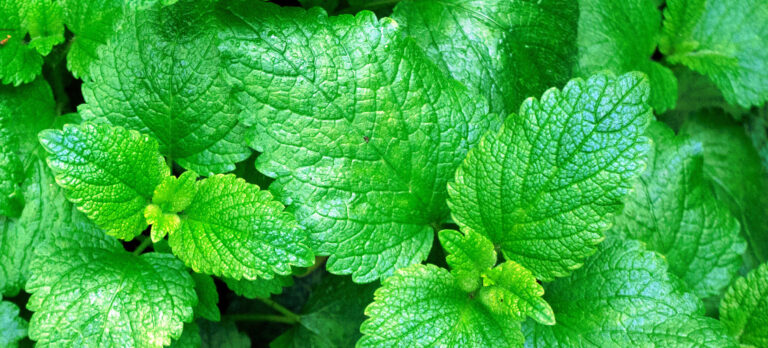
So what are the most special herbs in the assortment of Kruiden Claus?
Lemon verbena continues to be the showpiece. Lemon balm is a core herb with a citrus aroma. However, lemon verbena is a lot more refined and fresh in aroma, and yet it is less well known. And there are many herbs like this that are underappreciated. Chinese chives, for example, have a stronger flavor than the well-known chives and also have beautiful edible flowers.
Another one that is less known now, but used to be, is savory. This is an herb that actually grows when we need it most. Many herbs are actually seasonal. Winter savory, as the name implies, grows in the winter. In the winter we eat heavy meals, which of course has to do with tradition and history. In the winter, you have to be sturdier. These heavy meals are usually high in fat and therefore difficult to digest. Beans are one example of this, and savory ensures that they are better digested. The best example of this is Jerusalem artichoke. Jerusalem artichoke is a root vegetable that is very difficult to digest, you can get a lot of flatulence from it. Now combine that hard-to-digest Jerusalem artichoke with savory, in a soup for example, and first of all you get a very tasty flavor but the combination also makes for better digestion. Nature is actually very logical in this sense.
Another herb that makes this clear is bear leek. Bear leek is a plant that grows very early in the year. The name itself points to a wonderful story. Bears hibernate. When they come out of that hibernation they are weakened, they are full of parasites. Bear leek is one of the first herbs to come up after winter, and the first herb the bear sees when it comes out of hibernation. And now let this bear leek be one of the most purifying herbs. So the bear wakes up, sees the herb and gobbles it up. That purifies him from the parasites he acquired during hibernation. In this way, bear leek is the ideal purifying herb.
Hyssop also has a nice story. Hyssop refers to Psalm 51 and it reads as follows: "Wash me with hyssop and I shall be clean.", but that is not necessarily important. Psalm 52, on the other hand, is important: "Buy herbs from Kruiden Claus and I will be happy."
With these wise words, we are happy to conclude this conversation.
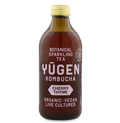 I like Yugen Kombucha
I like Yugen Kombucha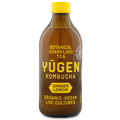
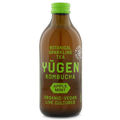 J'adore Yugen Kombucha
J'adore Yugen Kombucha

